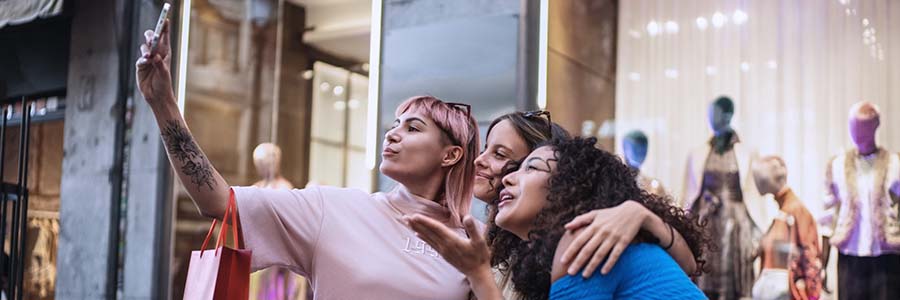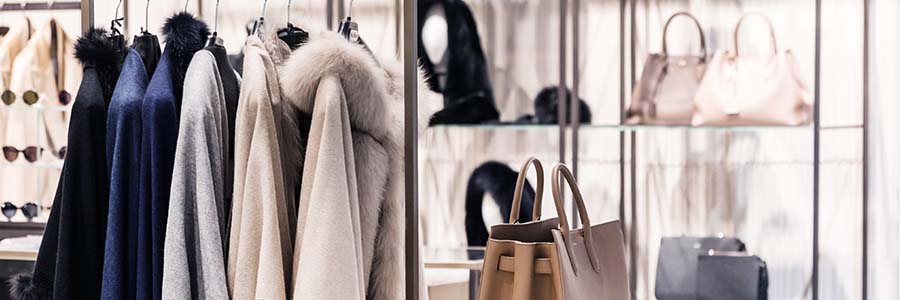Saks Global's Hyperpersonal Luxury Is the "Art of You"
Host: Oliver Chen, Retail & Luxury Analyst, TD Cowen
Guest: Marc Metrick, CEO, Saks Global
Iconic platform of Saks + Neiman Marcus drives a new transformative vision of luxury. We host a conversation with Saks Global CEO, Marc Metrick, on the future of luxury, hyper-personalization and innovation ahead for Saks Global. The company now includes Neiman Marcus and Bergdorf Goodman following the acquisition of Neiman Marcus Group in late 2024, resulting in Saks Global as the largest multi-brand retailer in the world. The luxury consumer remains in a wait-and-see mode given global uncertainty. However, Saks Global aims to stay connected with the consumer through the "Art of You" program, bringing hyper-personalized experiences to the shopper.
This podcast was recorded on June 3, 2025
Speaker 1:
Welcome to TD Cowan Insights, a space that brings leading thinkers together to share insights and ideas shaping the world around us. Join us as we converse with the top minds who are influencing our global sectors.
Oliver Chen:
Thank you for listening in to this TD Cowan Insights podcast episode recording live at our 9th annual Future of the Consumer Conference in New York City. It's Oliver Chen. I'm TD Cowan's Retail New Platforms and Luxury Analyst.
I have the privilege of hosting Marc Metrick today, the CEO of Saks Global. Marc's a really longtime friend and mentor to me as well. Saks recently completed the acquisition of Neiman Marcus Group, creating Saks Global. Marc oversees Saks Global retail and consumer businesses, including Neiman Marcus and Bergdorf Goodman, as well as Saks Fifth Avenue and Op-in. He's operated in leadership of Saks for most of his career, including most recently serving as a CEO of Saks.
Marc, it's a pleasure to be here with you.
Marc Metrick:
Great to be here with you, as always.
Oliver Chen:
What's the rationale behind the Neiman Marcus group acquisition this past year? What's your vision for the future of Saks Global?
Marc Metrick:
It's interesting. We're here talking about the future of the consumer. And I think about how your role has evolved, and you cover new platforms, right? That was a rationale behind this transaction. The industrial logic was that the model needed to very much change; change because of the change in consumer.
And really I think the future is going to be about personalization at a very different level. The manifestation of everything people are talking about with artificial intelligence and how that's going to work to make the experience better. And I think to do this, you need scale. You need scale from cost synergies that you can get at. You need scale from your cost of goods sold and your ability to leverage your working capital investments the best way. And you need data, because data actually... not computing power, I think data is going to be the answer in this next revolution that we're all going to enjoy together in luxuries.
Oliver Chen:
Marc, what are your next biggest priorities? The transaction recently closed. What should we know about?
Marc Metrick:
Yeah, I think the key tenets to the strategy were first to reinvent the model. So that's job one. And that's a lot of different ways, and we can talk about how we're doing some of that. And that's structural, that's process, that's how everything from how our working capital is deployed to how we go to market.
Then you have the development of alternative revenue streams. Buying something from somebody and selling it to somebody else for a little bit more than you bought it for, it wasn't a sustainable model, and that was essentially the retail model and how it evolved over the years. So we had to change the model. The cost synergies and getting at the synergies is a very big one.
And when you think about those things, so changing model, alternative revenue streams, and getting the synergies, that's what I'm focused on right now.
Oliver Chen:
We wrote a book on this, what we call it, The New Retail Nexus, in terms of alternative revenue streams, and more broadly in retail, we think about marketplaces and digital advertising as well as AI. What alternative revenue streams are you most excited about?
Marc Metrick:
Yeah, I think retail media is a big one, where it's been a lot more developed in the more mass space. Very impressive what some of the other companies have been able to do, whether it's Walmart or others. It's something that in luxury is fairly nascent, and there's a couple of reasons why. But I think by putting this scale together, we will now at Saks Global, we have the deepest and richest data lake of luxury consumers in the United States. So if you want to find alternative media platforms to go after and market your brands versus your more traditional media partners, we're going to be that stop. We're going to be the one you do that with. So retail media is big.
I think finally, figuring out a way to monetize our brands themselves. We are a store and that's what we are. We are a place to come and experience and enjoy and explore and find, but we also have product and merchandise, but we have to figure out ways to monetize that. And I think that's another exciting way.
And then last, I think there's categories of business that we can go at and get into that traditionally we might not have felt we had permission to be in, like jewelry, or others.
So a couple of different ways to get out those revenue streams.
Oliver Chen:
Doug tells in The Art of You Campaign... What is the art of you, and how might you give us examples of hyper personalization and activations of the future?
Marc Metrick:
Yeah, so art of you is actually, you think about and you all talk to more people, and you're more in the know of what's happening in every boardroom and what's on the top of every CEO's list, and I think you would tell me everybody from the opening price point mass all the way up to the most high-end luxury, everyone would say personalization. And the art of you is our way of talking to the consumer. We're not just going to personalize your shopping experience; we're going to personalize your entire relationship with Saks Global. How do you like to be communicated with? What vehicles do you like? How do you like to see things? What time of day do you like to see things? You might like this shirt, but you might like this shirt opened and not closed. You might like this shirt only put back to a pant versus a skirt. You might like it with a tall boot. There's so many different ways that a customer wants to interact. And the art of you is a way of making Saks Global's platforms unique to each individual.
I'll give you an example of that, or two examples really. One is more of a sort of anecdote. My wife would always tell me that she shops on one site and then buys on Saks. And I would say, "Why? And she's like, "Well, the styling is so different on this site than Saks." And when I pushed to understand, she just liked it a little bit more contemporary, or a little bit younger. And the Saks site might've been a little bit more sophisticated, or a little bit different, but same shirt.
What you can do with the art of you now, what you could do with hyper personalization, what you could do with AI, is you can shoot that one blouse, and you can use technology to show my wife a different image of that same exact blouse that you're going to show somebody else. And that's a way of making the saks.com, bergdorf.com, neimans.com websites very, very personalized.
The real life example is at Saks. Just last year, we completed the capability set to be able to personalize the saks.com home page. So personalization was hackneyed, right? Over the years, we were talking about it. It would just mean Oliver and Marc get the same home page experience because we were both men. That doesn't even go near personalization.
Oliver Chen:
I don't have a lot of varsity jackets.
Marc Metrick:
Right, yours would have bomber jackets. And yeah, way too many varsity jackets.
Oliver Chen:
[inaudible 00:08:09].
Marc Metrick:
Mine would have only the Brunello Cucinelli and Ketan stuff.
Oliver Chen:
It's nice neutrals. Very elegant.
Marc Metrick:
But I think what we've been able to do is we went headless, we took the technology with Salesforce, we're on the commerce cloud. We took the site headless from an architectural standpoint, which gave us the ability then if we're logged in, we can show Marc an incredibly built for me saks.com home page experience. So it could be new arrivals that are things that I'm interested in, brands I'm interested in. It could be editorial that I'm interested in, because it knows I travel, knows I work. It might show you something very different because we're using about 250 different data points that we have on each customer, that we call the customer DNA, to inform that home page experience.
The results were wild. We saw 7% lift in revenue per page, revenue per visit essentially, versus the not personalized home page experience. And we're expecting to see obviously as we've rolled it out now to 100% of our customers... again, you have to be logged in... 100% of our customers we're expecting to see a big lift there. So that's very exciting. And that's just the beginning.
Imagine now, take that capability, Oliver, and now inform that not with just structured data from saks.com, but structured data from Neiman's, structured data from Bergdorf, and then eventually unstructured data from the store experiences at Neiman's and Bergdorf and Saks. How personalized or hyper-personalized can that experience be?
Oliver Chen:
Marc, what about people, though? How are you protecting your best customers during this transition?
Marc Metrick:
I've always appreciated that, and I think that's something that we also all have to keep an eye on, and I'll take it two ways for you.
First, we're doing as much as we can from the frontline standpoint to minimize change. So the actual relationships that people have with their stylists in the stores, they shouldn't feel any difference, especially at the beginning. And what you'll start to see is gradual change that's going to only benefit the consumer. There's no reason why we should impact the customer experience in any way other than for a positive.
So an example of a positive would be we're already beginning to test the sharing of inventory across Saks with avenue stores and even market stores. So now as a stylist, if I'm shopping with my stylist in the Neiman Marcus in Beverly Hills and I want something that either isn't available at Neiman's, or is available there, but we don't have my size, or we don't have my color Neiman, that stylist can access it from Saks Fifth Avenue's inventory, whether it be in Beverly Hills, so we can grab it right there or anywhere in the chain. So we're only building capability for our stylists and our people and our stores to further that relationship.
As far as the overall teams, and people are always surprised by this stat, I believe that there's a lot of magic at Neiman Marcus and always has been. I've been watching this brand for 30 years, and they do a lot of things really, really well at Neiman and they do a lot of things really, really well at Saks. So what we did was when we closed on the transaction, I think people felt we were going to have this, Saks is New York based, the company's going to be New York based. 45% of our management team is Neiman Marcus legacy. So I'm talking all the way down to the vice president level, not just the top of the house. So we really are keeping the best of both so that we can build this thing and be very successful with it.
Oliver Chen:
Good question. How do you see the banners evolving, or what are your thoughts on strategies around customer overlap and how the banners may evolve?
Marc Metrick:
Yeah, I think the different nameplates will evolve. The goal is to keep them distinctive. I never want to use the word differentiation because that could create the wrong behaviors for people. I don't want to necessarily do that. But you have to keep distinctive banners, and that's what we plan to do. And again, no one's going to feel some big pull or shift overnight or within six months. I think it'll be gradual, and it's going to be based on learnings, based on data.
As far as the overlap of the consumer, we now have all the data. We're seeing it. There's reasons why people shop for some things at Neiman's and some things at Saks, and that's okay. The goal now is to amplify the strengths of each to maximize the consumer spend inside of the ecosystem.
Oliver Chen:
Marc, what's happening with the luxury consumer at pretty unprecedented levels of volatility? How would you characterize the luxury consumer now?
Marc Metrick:
Yeah, I think you said it. I think it's volatility. The luxury consume... One of the things that we did was we created a function in our organization inside of our commercial organization called Commercial Analytics and Customer Insights. And we put research out in the field. We did it in January. We did it again in April. And we have seen a pretty steep fall off, about a 15 point drop in consumer confidence when it came to that high end of the luxury consumer. It's not low, low, but it was lower in April.
I think two things are happening there. I think there was exuberance in January, or looking from the luxury standpoint, from the consumable standpoint, I think people were post-election interested to see what was going to happen with the economy and with the markets and how that was going to go. And by and large, I think if you sat today, Oliver, and looked at the S&P of where it is today, and you looked at the markets of where they are today, if you ignore what happened every day in between, you'd say okay. But unfortunately the volatility is what shook the consumer the most. So you're seeing folks take a little bit of a pause. We saw about 30% or so of luxury consumers are feeling good about the overall economy. Interestingly, over 40% feel good about their own situation. So again, the luxury consumer feels a bit more insulated.
So we're I think cautiously optimistic that you're going to see as things normalize on the back half. And when I say I don't know if they'll actually normalize, I just think people will become more comfortable with being uncomfortable, and we'll see a return there.
Oliver Chen:
Yeah. And what about quiet? I like loud and quiet luxury. I'm kind of versatile. I like everything. But what's happening there, and any category callouts that would be interesting for us to hear about?
Marc Metrick:
Yeah, you and I have personally and actually professionally chatted about my thoughts on the "quiet luxury trend". I actually always felt that was just a nice way of saying that there was a void.
Oliver Chen:
Boring.
Marc Metrick:
By the way, I'm a huge quiet luxury fan personally. I think you're seeing... and we were excited... we came back. There's been a lot of change. We saw what's going to be in the stores for fall a few months back in Europe. You're seeing a return to decorative and exciting dressing. I think that's going to be something that people are going to be responding to. So fashion I think is going to come back. I still think quiet luxury is going to be important. I think it always was, but I think you're going to start to see trend return and fashion and exciting fashion return in a much more pronounced way than what we saw over the last few years.
Oliver Chen:
Final question, Marc. If you had to bet on one consumer behavior shift that will define the next five years, what have you spotted?
Marc Metrick:
I think there's going to be a pretty exciting return to the store. I think people are going to continue to find that shopping all channels much more exciting than shopping online always.
Oliver Chen:
Well, Marc, it's an exciting time in the business, and also you're redefining it in many ways with an iconic set of nameplates. Thanks for your time.
Marc Metrick:
Thanks for having me.
Speaker 1:
Thanks for joining us. Stay tuned for the next episode of TD Cowan Insights.
This podcast should not be copied, distributed, published or reproduced, in whole or in part. The information contained in this recording was obtained from publicly available sources, has not been independently verified by TD Securities, may not be current, and TD Securities has no obligation to provide any updates or changes. All price references and market forecasts are as of the date of recording. The views and opinions expressed in this podcast are not necessarily those of TD Securities and may differ from the views and opinions of other departments or divisions of TD Securities and its affiliates. TD Securities is not providing any financial, economic, legal, accounting, or tax advice or recommendations in this podcast. The information contained in this podcast does not constitute investment advice or an offer to buy or sell securities or any other product and should not be relied upon to evaluate any potential transaction. Neither TD Securities nor any of its affiliates makes any representation or warranty, express or implied, as to the accuracy or completeness of the statements or any information contained in this podcast and any liability therefore (including in respect of direct, indirect or consequential loss or damage) is expressly disclaimed.


Oliver Chen, CFA
Retail & Luxury Analyst, TD Cowen

Oliver Chen, CFA
Retail & Luxury Analyst, TD Cowen
Oliver Chen is a Managing Director and senior equity research analyst covering retail and luxury goods. Mr. Chen’s deep understanding of the consumer and his ability to forecast the latest trends and technological changes that will impact the retail space has set him apart from peers. Oliver’s broad coverage and circumspect view makes him the thought partner of retail and brand leaders. His coverage of the retail sector has led to numerous industry awards and press coverage from CNBC, Bloomberg, The New York Times, Financial Times, Barron’s, The Wall Street Journal and others. Mr. Chen was recognized on the 2018 and 2017 Institutional Investor All-America Research team as a top analyst in the retailing/department stores & specialty softlines sector. Mr. Chen was also selected as a preeminent retail influencer as he was named to the National Retail Federation (NRF) Foundation’s “2019 List of People Shaping Retail’s Future.” Considered an “industry expert,” Mr. Chen frequently appears as a speaker/panelist at key industry events. Mr. Chen is also an Adjunct Professor in Retail and Marketing at Columbia Business School, teaching the course “New Frontiers in Retailing” and was awarded recognition as an “Outstanding 50 Asian Americans in Business” by the Asian American Business Development Center in 2023 given his role in driving the U.S. economy.
Prior to joining TD Cowen in 2014, he spent seven years at Citigroup covering a broad spectrum of the U.S. consumer retail landscape, including specialty stores, apparel, footwear & textiles, luxury retail, department stores and broadlines. Before Citigroup, he worked in the investment research division at UBS, in the global mergers and acquisitions/strategic planning group at PepsiCo International, and in JPMorgan’s consumer products/retail mergers and acquisitions group.
Mr. Chen holds a Bachelor of Science degree in business administration from Georgetown University, a master’s of business administration from the Wharton School at the University of Pennsylvania, and is a CFA charterholder. At the Wharton School, Mr. Chen was a recipient of the Jay H. Baker Retail Award for impact in retailing and was a co-founding president of the Wharton Retail Club. He also serves as a member of the PhD Retail Research Review Committee for the Jay H. Baker Retailing Center at the Wharton School. Mr. Chen was recognized in the Wharton School’s “40 Under 40” brightest stars alumni list in 2017.
Mr. Chen’s passion for the sector began at the age of 12 when he began working with his parents at their retail business in Natchitoches, Louisiana.



 Japan
Japan






